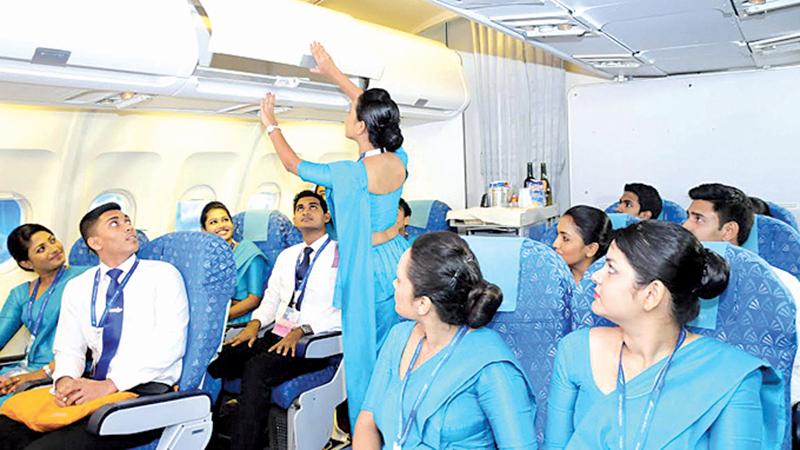
The SriLankan Aviation College (SLAC) will team up with globally renowned universities to bring world-class training programs to the doorstep of Sri Lankan students and help them make a lucrative career in the rapidly expanding global aviation industry.
SLAC with over three decades in training and one of the few European Air Safety Agency (EASA) approved training institutes in Asia on avionics and mechanical streams, has structured programs and courses to enhance career development of aspiring students to reach global heights in much sought after professions.
“We are in negotiations with globally renowned universities such as the Kingston University London and two others in Australia to offer local and international students the best of class training to scale up the professional ladder,” SLAC General Manager Primal de Silva said.
Officials of Kingston University will be in the country next month to put things in place for operations in the country, a senior trainer of the College said.
“We will be going for top tier universities and will be investing on training to attract more foreign students,” he said.
The College currently has around 126 foreign students primarily from the Maldives and the Middle East, following its courses. The enrolment of foreign students has grown substantially over the years according to the College managers.
The interest in the aircraft engineering and maintenance has been growing across the globe due to the demand for such professions that offers handsome remuneration in whatever the country they serve.
What is unique at the SLAC is that it offers courses at an affordable cost which is almost half of the rates of world recognized training institutions. A course which would cost around US$ 55,000 in Turkey is offered at half of the cost at the SLAC.
Around 600 students follow training at any given time and currently we are running three batches,” de Silva said. SLAC which has invested around Rs. 47 million on a training facility at the College premises has plans in the pipeline to bring in more technology and facilities to further upgrade training.
“We are a US$ 1billion revenue earning institution with no burden to the company. We have developed certain faculties with our own funds. The College generated a revenue of US$ 1.5 billion last year and aims to surpass that figure in the coming years,” de Silva said.
However, what is disappointing is that the hard work of those who have strained every nerve to bring the institution to what it is today is not being recognised adequately by policy makers.
“We want the policy makers to realise the enormous potential of the institution to contribute to the economy. There is a dire need for more hostel facilities, equipment and simulators,” a top official of SLAC said while appealing from higher officials to build links with airlines and aviation companies create career opportunities for local students who have completed training.
The global aviation industry is growing at a rapid pace creating a vast need for employees in the industry. According to IATA, the number of scheduled passengers boarded by the global airline industry has increased from 1997 in 2004 to 4311 million in 2008.
As per the forecast by ICAO the global aviation industry will need 620,000 pilots, 650,000 maintenance personnel, 840,000 cabin crew members by 2036e revealing the potential of the industry.
Having recognised the need to upgrade the current training standards in the country, SriLankan Airlines, the national carrier launched the integrated aviation training academy, the SLAC opening up a world of opportunity for ambitious students to the first step towards a promising career in aviation.
SLAC which offers a wide range of structured training programs, is well positioned to be the hub for professional aviation training in Sri Lanka and in the region.
“With a wide experience in aviation training to international standards we provide top graded training by working hand in hand with airlines recognizing vital areas of development o offer students hands on experience,” a senior trainer said.
The College offers courses with easy payment loan schemes from banks for students of low income families certain courses permitting students to pay once they start working and six months on the job free training.
With regard to affordability of courses de Silva said the College is open to any student keen to pursue a promising career. Most of our students are from far off areas and are not so well to do.
“It is unfortunate that many parents regret for having missed an opportunity to provide a lucrative career path for their children through a comprehensive on the job training on avionics,” said.
Warding off misconceptions that travel and tourism is not for females, de Silva said one of the top trainers of the College is a student of the College.
SriLankan Airlines Manager Media Relations and PR, Deepal Perera said one need not have to go far to look for how women have made to the top of their profession. Some of the top positions at SriLankan Airlines are held by females. The training arm of SLAC comprise the International Aviation Academy (IAA) and the SriLankan Technical Training (STT). The College is being certified by the International Air Transport Association (IATA), the EASA and the International Civil Aviation Organisation (ICAO).
IAA is rated in the top ten IATA training facilities for non technical professional training in aviation. It specializes in providing airport passenger handling, dangerous goods regulations, flight dispatchers and potential functional training areas of an airline.
Apart from being approved
by EASA, STT is also approved by the aviation regulators of Sri Lanka (CAASL), (CAD) and Pakistan (CAA) to conduct training in Avionics and Mechanical streams meeting EASA standards Part 66.
